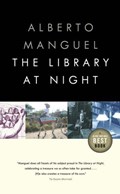In the tradition of A History of Reading, this book is an account of Manguel’s astonishment at the variety, beauty and persistence of our efforts to shape the world and our lives, most notably through something almost as old as reading itself: libraries. The Library at Nightbegins with the design and construction of Alberto Manguel’s own library at his house in western France – a process that raises puzzling questions about his past and his reading habits, as well as broader ones about the nature of categories, catalogues, architecture and identity.
Thematically organized and beautifully illustrated, this book considers libraries as treasure troves and architectural spaces; it looks on them as autobiographies of their owners and as statements of national identity. It examines small personal libraries and libraries that started as philanthropic ventures, and analyzes the unending promise – and defects – of virtual ones. It compares different methods of categorization (and what they imply) and libraries that have built up by chance as opposed to by conscious direction.
In part this is because this is about the library at night, not during the day: this book takes in what happens after the lights go out, when the world is sleeping, when books become the rightful owners of the library and the reader is the interloper. Then all daytime order is upended: one book calls to another across the shelves, and new alliances are created across time and space. And so, as well as the best design for a reading room and the makeup of Robinson Crusoe’s library, this book dwells on more "nocturnal" subjects: fictional libraries like those carried by Count Dracula and Frankenstein’s monster; shadow libraries of lost and censored books; imaginary libraries of books not yet written.
The Library at Nightis a fascinating voyage through the mind of one our most beloved men of letters. It is an invitation into his memory and vast knowledge of books and civilizations, and throughout – though mostly implicitly – it is also a passionate defence of literacy, of the unique pleasures of reading, of the importance of the book. As much as anything else, The Library at Nightreminds us of what a library stands for: the possibility of illumination, of a better path for our society and for us as individuals. That hope too, at the close, is replaced by something that fits this personal and eclectic book even better: something more fragile, and evanescent than illumination, though just as important.

